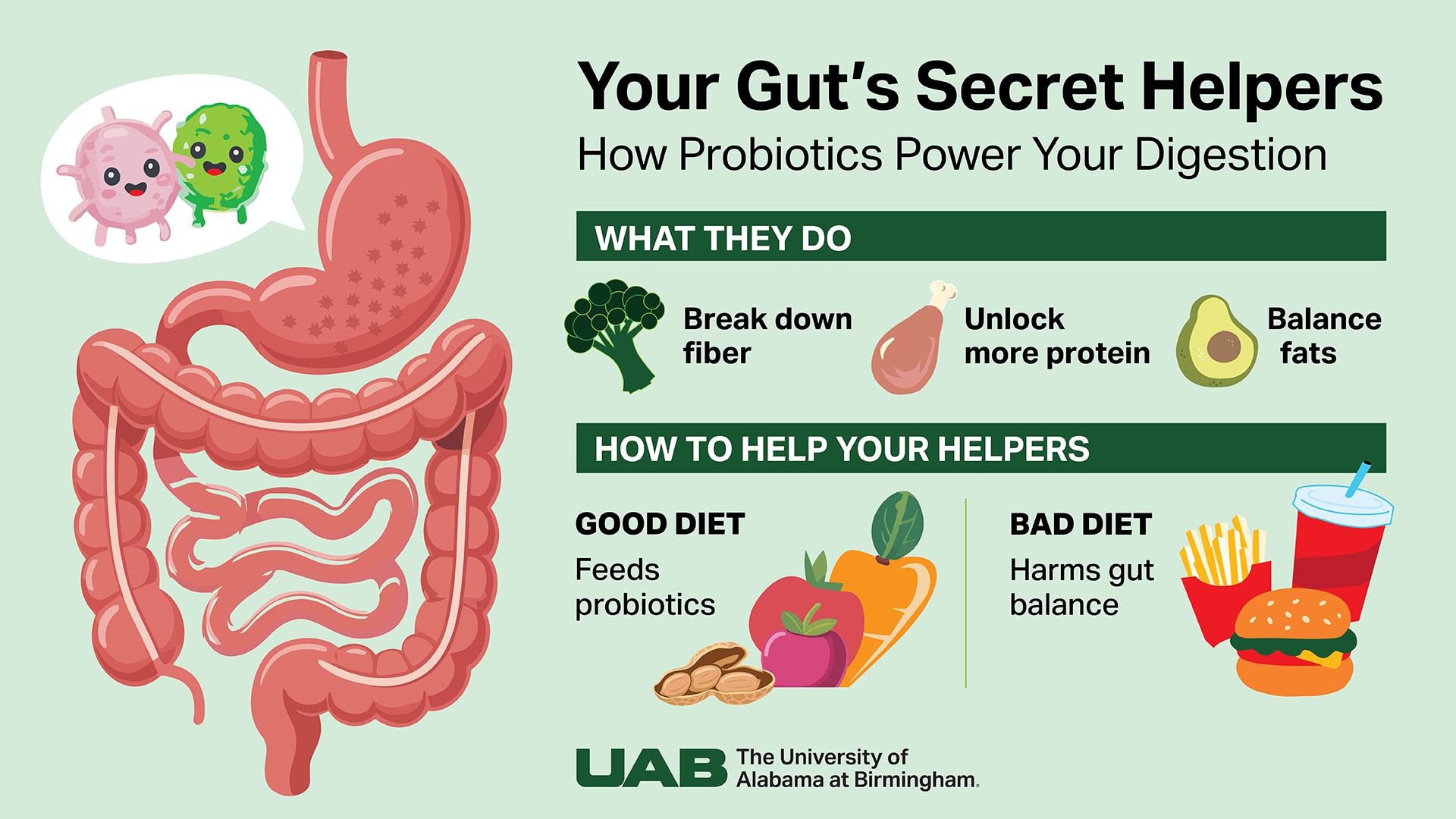The stomach is not the only one digesting lunch — so are microbes. Every time someone eats, an entire ecosystem inside their gut gets to work, breaking down food, absorbing nutrients and boosting the immune system.
Probiotics, live microorganisms found in certain bacteria and yeasts, are at the heart of this process; but understanding how they function can be more complicated than it seems.
“While often associated with illness, bacteria plays a vital role in maintaining our health,” said Michael J. Gray, Ph.D., associate professor in the University of Alabama at Birmingham Department of Microbiology. “The scientific community is increasingly recognizing this, and our research focuses on uncovering the mechanisms these microbes use to support the body.”
Digestion might seem like a simple process confined to the stomach, but the reality is far more intricate.
Fiber: Fuel for gut health
Probiotic bacteria help break down complex carbohydrates that escape digestion in the small intestine, commonly known as fiber.
“Unlike simple sugars, these aren’t used for energy but rather help by promoting regularity, and their breakdown products can assist in controlling blood sugar and lowering cholesterol,” said Sierra C. Hansen, a graduate trainee in Gray’s lab in the UAB Department of Microbiology. “Together, these effects help mitigate the risk of development or progression of chronic health conditions like Type 2 diabetes and heart disease.”
Unfortunately, fiber is one thing many diets are missing.
“Very few people are actually hitting their daily intake goals,” Hansen said. “Thirty grams is a good rule of thumb.”
Proteins: Helping the body absorb more
Probiotics can help the body get more out of the protein that is consumed either by producing enzymes that directly break proteins into smaller parts or by stimulating the body’s own digestive enzymes to do the job more effectively.
“This process is important for gut health as it increases the bioavailability of protein, an essential nutrient, which means the body has an easier time absorbing and utilizing it,” Hansen said.
Fats: Supporting healthy metabolism
Fats are not off the hook either; probiotics can help here, too. Lactobacillus rhamnosus GG has been shown to compete for fat absorption in the intestines, reducing how much fat the body takes in.
“Probiotics modulate lipid and bile acid metabolism through the production of digestive enzymes and bile salt hydrolases,” Hansen said. “That directly impacts absorption and utilization of lipids and cholesterol.”
Fatty acids, components of fat, are essential for storing energy and supporting cellular function. Some are especially important in gut health.
“Short-chain fatty acids, or SCFAs, which contain fewer than six carbon atoms, are absorbed by intestinal cells and help to support gut barrier integrity, regulate inflammation and improve cellular metabolic health,” Hansen said.
Probiotics promote the production of these SCFAs by fermenting fiber. Even if certain probiotic strains cannot ferment fiber directly, they often stimulate other bacteria that can.
What affects how well probiotics work?
The gut is constantly changing, and that can affect how well probiotics do their job.
“Variability in pH is a great example,” Hansen said. “The acidic environment of the stomach can impact which probiotics are able to make it to the small intestine and beyond. Any changes to that acidity, like taking antacids or PPIs to help with acid reflux, can alter transit and efficacy of probiotics.”
The gut’s existing bacterial community plays a major role. Everyone’s microbiome is different, and new probiotic species must compete to survive.
Still, diet remains one of the most controllable variables.
“Diets high in fiber and other prebiotics, which can be thought of as probiotic ‘food,’ increase survival and activity of beneficial microbes,” Hansen said. “Diets high in saturated fats, sugars and highly processed foods have the opposite effect.”
What science says about probiotics and gut health
Many studies demonstrate that probiotics are known to help with a variety of digestive health issues, including bloating, irritable bowel syndrome and even inflammatory bowel disease.
“Multiple meta-analyses and systematic reviews support the role of probiotics in reducing the severity of IBS symptoms, including abdominal pain, bloating and flatulence,” Hansen said. “In the setting of IBS, probiotics can help reduce symptoms and maintain remission, particularly in ulcerative colitis.”
There is strong evidence that probiotics can shorten the duration and intensity of diarrhea, especially following infections or antibiotic use.
To understand how probiotics work, researchers study them directly in the gut using stool samples and intestinal biopsies.
“Molecular techniques like quantitative PCR, metagenomic sequencing and other analytic methods on these samples can help provide insight into the ability of probiotics to colonize and persist in the gut, as well as how they are impacting the resident microbiome,” Hansen said.
Laboratory studies using cultured cells and intestinal organoids, tiny lab-grown replicas of gut tissue, help scientists explore these effects in a controlled setting.
Together, this growing body of clinical and experimental research is providing a better understanding of how these microscopic allies support digestive health from the inside out.
